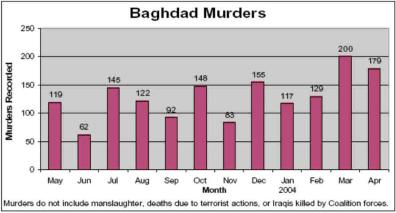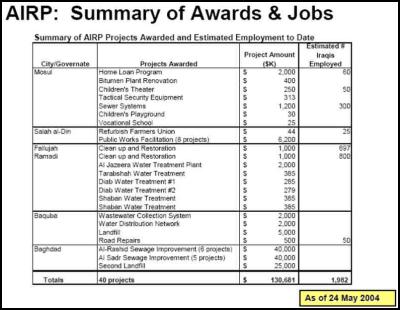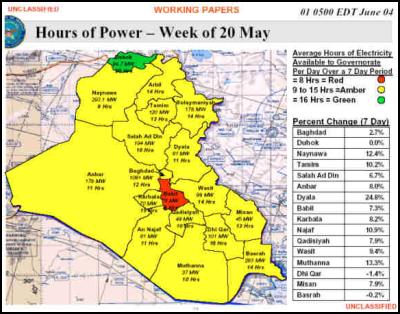Patricia Johnson: Are You Responsible?
Are You Responsible?
By Patricia Johnson
Did you write to your Senator or Representative? Did you write to the President? Did you call so that your voice could be heard? Did you send a fax detailing your opposition? Or, did you just sit by the TV and say “well, that’s just all part of politics and there’s nothing I can do”?
Did you go to Washington D.C. to participate in the April 20, 2002 march to stop the war or did you spend the day planting spring flowers?
Did you call your friends and neighbors and ask them to write, call or fax their representatives, or did you spend your day watching a baseball game or your favorite soap opera?
I did it all -- I called my representatives, I sent letters, I sent faxes, I called my friends and family and asked for their support, and I went to Washington D.C. for the April 20, 2002 march -- the very first march against war in Iraq.
Yet, I’m still responsible because I didn’t do more. I’m responsible because I didn’t spend more hours calling people to request support, I didn’t write more letters, send more faxes, or make more calls to the offices of our legislators. In other words, I didn’t fight hard enough or long enough for either the soldiers, or for the people of Iraq.
While reading the news, that fact is brought home over and over again. Pravda.ru is running an article (click here) about Iraqi women prisoners being raped, by American soldiers, while incarcerated. We already know that Americans tortured the male prisoners, so it should come as no surprise to anyone that female soldiers may have been raped by our troops.
Rape in Iraq is different from rape in the U.S. When a female is raped in America she is, in most cases, considered a victim. In Iraq, when a women is raped it brings shame and degradation upon the entire family, and in some instances Iraqi women are committing suicide as an alternative to facing social isolation.
My next glimpse into reality was a look at the U.S. Casualty Report (click here) indicating that a total of 6,278 soldiers have died or been wounded since the beginning of combat operations on March 19, 2003. This report only covers American casualties participating in Operation Iraqi Freedom or Operation Enduring Freedom and does not include Iraqi or coalition partner casualties.
The CPA can probably tell us to the very last ounce, how many barrels of oil have been exported, yet they apparently do not keep records of how many Iraqi’s have been killed or wounded since our “Shock and Awe” campaign began. Although it doesn’t appear to be important enough to track how many Iraqi’s we kill, we do track how many Iraqi’s kill each other in Baghdad, as indicated on the Department of Defense weekly report of June 4, 2004.

Click for big version
Source: Department of Defense, Weekly Report, Working Papers Iraq Status June 4, 2004
Our congressional leaders appropriated $18.4 billion dollars for the reconstruction of Iraqi infrastructure, with $12.6 billion specifically earmarked for 2,300 different construction projects.
With the influx of money you would think that every available worker that isn’t held in prison would be working. Yet, the PMO report of May 24, 2004 indicates that out of the 40 accelerated projects totaling $130,681,000.00 only 1,982 Iraqi’s are employed.
Most in, what appear to be, menial labor jobs (697 working on clean up and restoration in Fallujah, and 800 working on clean up and restoration in Ramadi).
An additional 300 Iraqi’s are working in Mosul on sewer improvements (the PMO is defining sewer improvement as “Remove Raw Sewage”. In total 7,335 Iraqi’s were working for the PMO as of May 18, 2004. [Iraq has an unemployment rate of 28% and an underemployment rate of 21.6%].
The following chart provides a breakdown of the 40 accelerated projects.

Click for big version
Source: Coalition Provisional
Authority
Program Management Office
Pentagon
Backgrounder
David Nash, ADM (Ret),
Director
May 24, 2004
On June 11, 2004, Ambassador L. Paul Bremer III, and Lt. Gen. Ricardo Sanchez prepared a joint statement regarding the city of Babylon (Babil). The statement was based on the findings of a team of archaeologists and Iraqi antiquities experts that were sent to assess the condition of an archaeological site located at Camp Alpha. Camp Alpha is a Coalition base that was originally established in 2003 for the purpose of protecting and defending the ancient city of Babylon. Based on the directives issued it’s possible that, in addition to all our other blunders; Babylon may have suffered archaeological damage on our watch.
“1) Issued a directive calling for all contractors working in or around the vicinity of the Babylon site to halt any activities that are or may be likely to cause archaeological damage, 2) Directed an official investigation into the construction and expansion of Camp Alpha to ensure that the Coalition is respecting the surrounding archaeological site, 3) Instructed that planning begin for the relocation of all Coalition troops in the immediate area of Babylon, and 4) Consider remediation for any damage determined through the investigation.”
The ancient city of Babylon or (Babil, “gate of God”) is one of the most important cities of the ancient world. Remediation, according to the American Heritage Dictionary is “the act or process of correcting a fault or deficiency”. Assuming there may be damage, how does the U.S. go about correcting damage to a city that’s older than time and was home to one of the Seven Wonders of the World?
We stormed into and invaded this country without justification. We bombed everything in sight, including private homes, and imposed terror and fear upon the innocents of the land. Our presence has deprived these people of food, water, electricity and medical supplies and almost 15 months later there are still major shortages.
We've arrested and imprisoned thousands upon thousands of innocent Iraqi’s, only to find out that between 70%-90% may have been arrested in error. We interrogated using methods of torture that are abhorrent to the average person, and in some instances used techniques so severe they caused death. We completely ignored the customs and religious beliefs of the people, and even went so far as to rape their women while imprisoned.

Click for big version
15 months later there are still parts of Iraq that have average hours of electricity per day, over a 7 day period, of only 8 hours. We demand action if our power is interrupted for a few hours, yet these people have been without adequate power for months.
More than once Donald Rumsfeld has commented that the press tends to understate the good that is being accomplished in Iraq. No matter how many soccer stadiums we build, or schools we renovate, it does not overshadow the fact that basic needs are still not being met in this country.
If there is a next time, maybe we will all remember what happened in Iraq and take the time to do whatever it takes to stop the war and negotiate the peace.
© 2004 Patricia L Johnson


 Binoy Kampmark: Squabbling Siblings - India, Pakistan And Operation Sindoor
Binoy Kampmark: Squabbling Siblings - India, Pakistan And Operation Sindoor Gordon Campbell: On Budget 2025
Gordon Campbell: On Budget 2025 Keith Rankin: Using Cuba 1962 To Explain Trump's Brinkmanship
Keith Rankin: Using Cuba 1962 To Explain Trump's Brinkmanship Binoy Kampmark: The Killing Of Israeli Embassy Staffers - Netanyahu’s Antisemitism Canard
Binoy Kampmark: The Killing Of Israeli Embassy Staffers - Netanyahu’s Antisemitism Canard Keith Rankin: Zero-Sum Fiscal Narratives
Keith Rankin: Zero-Sum Fiscal Narratives Eugene Doyle: Chinese Jet Shoots Down France’s Best Fighter; NZ And Australia Should Pay Attention
Eugene Doyle: Chinese Jet Shoots Down France’s Best Fighter; NZ And Australia Should Pay Attention